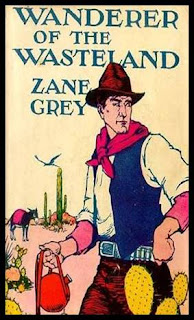Wanderer of the Wasteland by Zane Grey
Zane Grey’s
take on Homer’s Odyssey turns up in Wanderer of the Wasteland, the
story of a boy named Adam who flees his past and a terrible crime. Adam
seeks refuge in the desert, where life is unrelentingly hard and every
day brings a battle against the alkali sands, scorching heat, lonely
nights, no-account highway men, and tempting yet treacherous women. It’s
a coming-of-age tale and a landscape painting and an adventure story,
as well as a romance novel and an existentialist inquiry into the nature
of man’s solitude and unhappiness. And GOLD! Lots of GOLD!
Nobody writes landscape better than Zane Grey. That makes sense given
how much time and money he spent in the desert. The man knows the
colors, the mountains, the various textures of sand, the cacti that
sting, the flowers that bloom, the horny toads and eagles and condors
and sheep. He paints word pictures, most of which translate successfully
onto the page. He populates his desert with memorable characters, like
Dismukes, a gold miner who toils in the canyons and furnace winds of the
desert his whole life, working to save a half million dollars in gold
dust, only to find that he is miserable anywhere else but the desert.
His story is a tragedy, a cautionary fable about the hazards of too much
work and not enough play. Or there is Jinny, a headstrong burro that
Grey uses for comic relief. One amusing scene features Jinny getting
into Adam’s dough, whereupon a chase ensues, wrecking the campsite, the
man cursing the burro’s name as she gallops just out of reach,
contentedly chewing his supper.
Adam himself makes a pretty good everyman, though he sometimes
vacillates between emotional extremes in ways more befitting a romance
novel than a western. He is no gunslinger. He’s a boy on a quest to
discover why the desert holds such fascination for men. What’s eerie
about Adam is how, in his headlong rush to punish himself over the crime
that sent him into the desert to begin with, he denies himself the
usual earthly pleasures and attachments. He turns down money. He turns
away from women. Whenever he lands in a settlement of any kind, he soon
enough turns nomad. Adam is almost a Buddhist in his ability to float
above his appetites. I suspect that, sooner or later, every reader will
lose patience with Adam’s hand-wringing, or stop believing in his
purity.

No comments:
Post a Comment